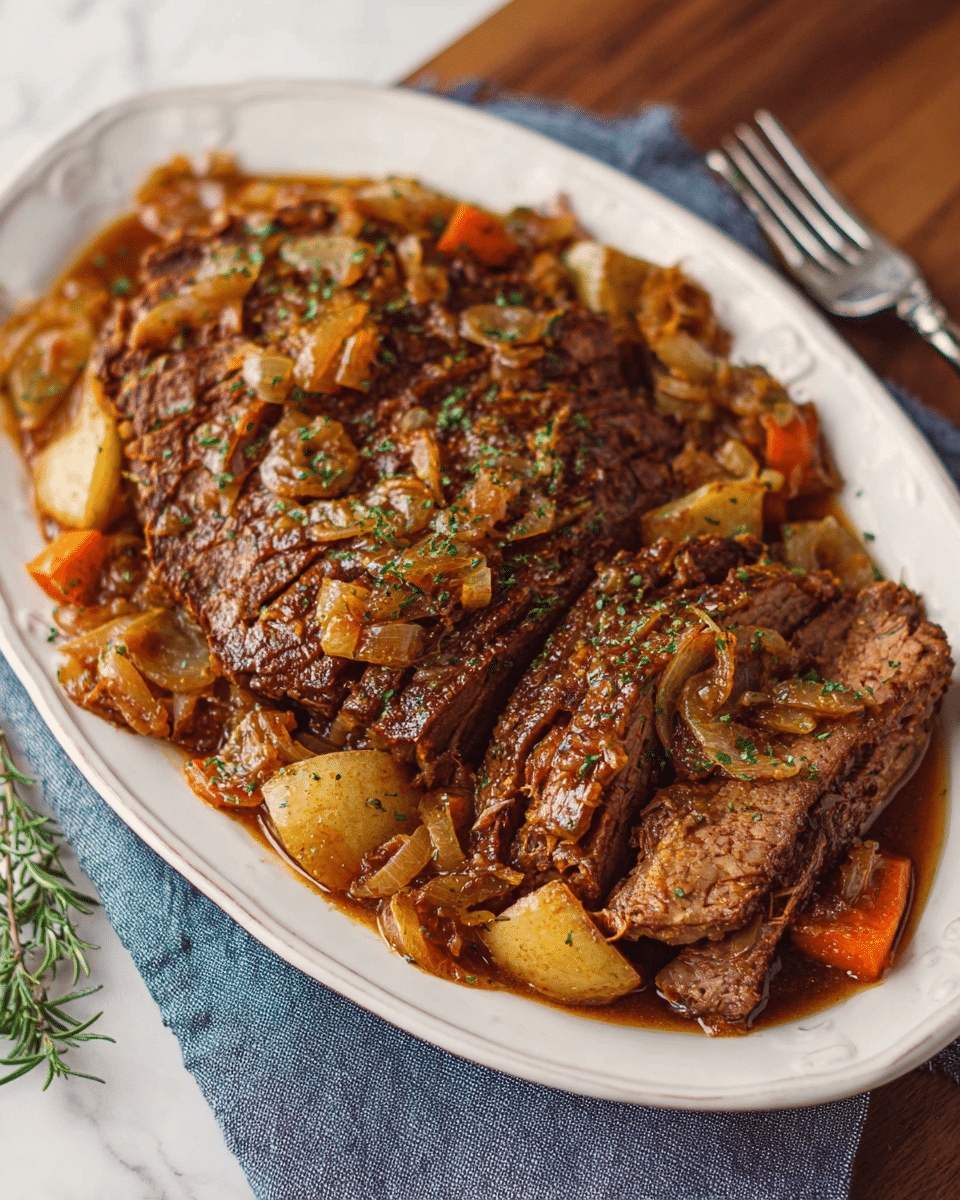The Origin of Brisket in Jewish Cuisine
Brisket has long been a staple in Jewish cuisine, particularly in Ashkenazi Jewish traditions. This cut of beef, known for its toughness, requires slow and long cooking to break down the connective tissues, resulting in tender, flavorful meat. Traditionally, Jewish brisket is cooked with onions, garlic, and a variety of seasonings, often using a slow braise to create a juicy and flavorful roast. The brisket is typically served as the main dish during Jewish holidays such as Rosh Hashanah and Passover.
The use of brisket in Jewish cuisine dates back to the European Jewish diaspora, where the cut of beef was relatively affordable and versatile. Over the years, many Jewish families have developed their own variations of the dish, adding regional spices and cooking methods to suit their personal preferences. In this recipe, the brisket gets a modern twist by incorporating flavors from Puerto Rican cuisine, making it even more special.
What Makes This Brisket Recipe Unique?
What sets this Jewish brisket recipe apart is the infusion of Puerto Rican flavors that bring a touch of Caribbean warmth to the traditional Jewish brisket. The combination of onions, beef broth, garlic, and Montreal Steak Seasoning creates a savory base for the dish, while the reduced sodium Worcestershire sauce adds an extra layer of umami flavor. The inclusion of onions, which are spiralized or thinly sliced, infuses the brisket with aromatic sweetness as it bakes.
Another standout feature is the marinade process. By allowing the brisket to sit in its marinade overnight, the flavors have time to penetrate the meat, ensuring that every bite is filled with savory, rich taste. This slow and steady marination process is key to achieving the tenderness and depth of flavor that this dish is known for.
The Key Ingredients and Their Roles
While the ingredient list for this recipe may seem simple, each component plays an important role in creating the final dish. The brisket itself, being the star of the show, is an affordable and flavorful cut of beef that responds well to slow cooking. The onions, which are a crucial component of the recipe, not only add sweetness but also help create a rich, aromatic base for the brisket. By spiralizing the onions or slicing them thinly, the onions caramelize and meld with the beef as it cooks, enriching the dish with their flavor.
The Montreal Steak Seasoning, a well-known spice mix that includes salt, black pepper, garlic, onion, paprika, and red pepper, adds a spicy kick to the dish. The Worcestershire sauce further enhances the savory aspect of the brisket, giving it that deep umami flavor that brings everything together.
Beef bone broth (or regular beef broth) is used to create a rich cooking liquid that helps tenderize the brisket while infusing it with more flavor. The longer the brisket bakes, the more the broth soaks into the meat, creating a deliciously juicy and flavorful roast.
Why Marinate Overnight?
One of the key tips for achieving a tender and flavorful brisket is allowing it to marinate overnight. The overnight resting period in the fridge allows the brisket to absorb the flavors of the marinade, resulting in a deeper, more complex flavor. This process also helps break down the tougher fibers of the brisket, making it more tender. While marinating overnight is ideal, if time is limited, the brisket can be cooked the same day, though marinating for a longer period will yield better results.
The Cooking Process: Low and Slow
The secret to a perfect brisket is low and slow cooking. This technique ensures that the meat becomes tender and juicy while allowing the flavors to develop gradually. The recipe calls for cooking the brisket at 350°F for the first 90 minutes, allowing the meat to begin tenderizing while the flavors from the seasoning and broth are absorbed. After the initial 90 minutes, the oven temperature is reduced to 325°F and the brisket continues to bake for another 4.5 hours.
During this time, it is essential to baste the brisket every 30 minutes. Basting helps keep the meat moist, ensuring that it doesn’t dry out as it cooks. Uncovering the brisket in the last hour of baking allows the top to caramelize, creating a delicious, crispy exterior that contrasts beautifully with the tender, juicy interior.
The Importance of Resting the Brisket
Once the brisket has finished cooking, it is important to let it rest for at least 20 minutes before slicing. Resting allows the juices within the meat to redistribute, ensuring that every slice is moist and tender. Cutting the brisket against the grain is also essential, as it ensures the meat is easy to chew and that each bite is as tender as possible.
Serving Suggestions
This Puerto Rican-inspired Jewish brisket is versatile and can be served with a variety of side dishes. For a traditional touch, pair it with roasted potatoes, matzo ball soup, or kugel. You can also serve it alongside a fresh salad or steamed vegetables for a lighter, more balanced meal. The rich, savory flavor of the brisket also pairs well with a glass of red wine, making it an ideal choice for a special occasion dinner.
Nutritional Information
While this brisket is undoubtedly a flavorful indulgence, it also provides a decent amount of protein, which makes it a satisfying and filling meal. A typical serving contains around 350-400 calories, with 40-45 grams of protein, 20-25 grams of fat, and 15-18 grams of carbohydrates. The brisket is also rich in iron, which is essential for maintaining healthy red blood cells, and provides a good source of potassium and vitamin C.
The Significance of This Recipe
This Jewish brisket with a Puerto Rican twist is more than just a meal; it’s a celebration of cultural fusion. By combining the rich traditions of Jewish cooking with the bold flavors of Puerto Rican cuisine, this recipe offers a unique and exciting dish that honors both cultures. Whether you are preparing it for a family gathering, a holiday meal, or a special celebration, this brisket will undoubtedly become a favorite in your culinary repertoire.
Conclusion
Incorporating a Puerto Rican twist into the traditional Jewish brisket recipe results in a flavorful and tender dish that is perfect for any special occasion. The combination of savory spices, caramelized onions, and rich beef broth creates a melt-in-your-mouth experience that is both comforting and exotic. By allowing the brisket to marinate overnight and cooking it low and slow, you ensure that the flavors penetrate deep into the meat, resulting in a dish that is both tender and flavorful. Whether you’re honoring family traditions or introducing a new twist to a beloved recipe, this Jewish brisket with a Puerto Rican flair is sure to be a crowd-pleaser.






